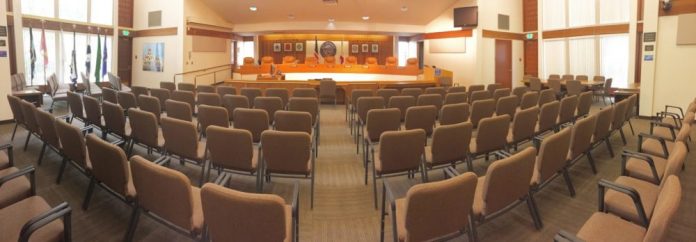A vote by the city council on the deletion of a few lines of city code this week became a new aspect of the Steven Juarez case. The vote had no direct connection to the case, but the council action had the effect of blocking release of all past internal police records, at least temporarily, while a new state law is argued in the courts.
Exactly one year after Juarez died while in police custody, his family, friends and community members gathered at City Council chambers for the council meeting on Feb. 25. The council voted 6-1 to delete a portion of the Gilroy City Code in order to comply with the new Senate Bill 1421, which went into effect Jan. 1. The action was tagged on the meeting agenda as an “emergency ordinance.”
SB 1421 requires police agencies in California to release internal police investigation records related to shootings or use-of-force incidents involving an officer, or an accusation of misconduct or certain types of crimes against an officer. The records newly opened by the law, which amends the state’s Public Records Act, include certain personnel documents and complaints against officers.
The application of the law to older records is currently on hold as it has been challenged by police organizations that are awaiting clarification on the law’s intent from a higher court.
Gilroy’s city code, like that of many California cities, previously prohibited the release of local agency peace officer personnel files and records of citizen complaints. The new state law would allow those records to be public, but there are several disputes in court over whether or not that decision applies to records in existence before Jan. 1.
California Attorney General Xavier Becerra has argued that the law only applies to cases created after Jan. 1, 2019. Locally, the dispute over whether or not to adopt the attorney general’s recommendation brought a renewed fight over public transparency, particularly when it came to the Juarez case.
City Attorney Andy Faber told the council that with preliminary rulings going in both directions, allowing the records to be accessed retroactively—before a definitive court ruling—could open the city to litigation. The council’s Feb. 25 action prohibits the city from releasing police personnel records in existence before Jan. 1, at least until the courts clarify the meaning of SB 1421.
First Amendment and civil liberties advocates have argued that the state law does apply retroactively, as previous amendments amendments to the state’s Public Records Act have.
The Juarez family begged the council to release documents relating to Juarez’s death and said that not fully abiding by the new law continued to deprive the family of answers. Many speakers said the council’s decision was evidence the city was hiding aspects of Juarez’s death.
Juarez’s sister Monica Juarez addressed the council about her hope that police documents surrounding the case would offer answers to her brother’s death. She said there are “so many pieces to the puzzle missing.”
Council members offered some of their first comments in the year since Juarez’s death. Mayor Roland Velasco said it was “unfortunate” SB-1421 was passed with as much ambiguity as it was. “All the City of Gilroy is doing right now is following what the California attorney general is recommending.”
The council passed the resolution in a 6-1 vote, with council member Fred Tovar voting against the ordinance.
City Manager Gabe Gonzalez said that public record requests regarding the Juarez case would be answered now that a decision had been made by the council about SB-1421. The Dispatch has filed numerous public records requests in relation to the Juarez case, which have thus far been delayed by the ongoing nature of the DA’s and police department’s investigation.















